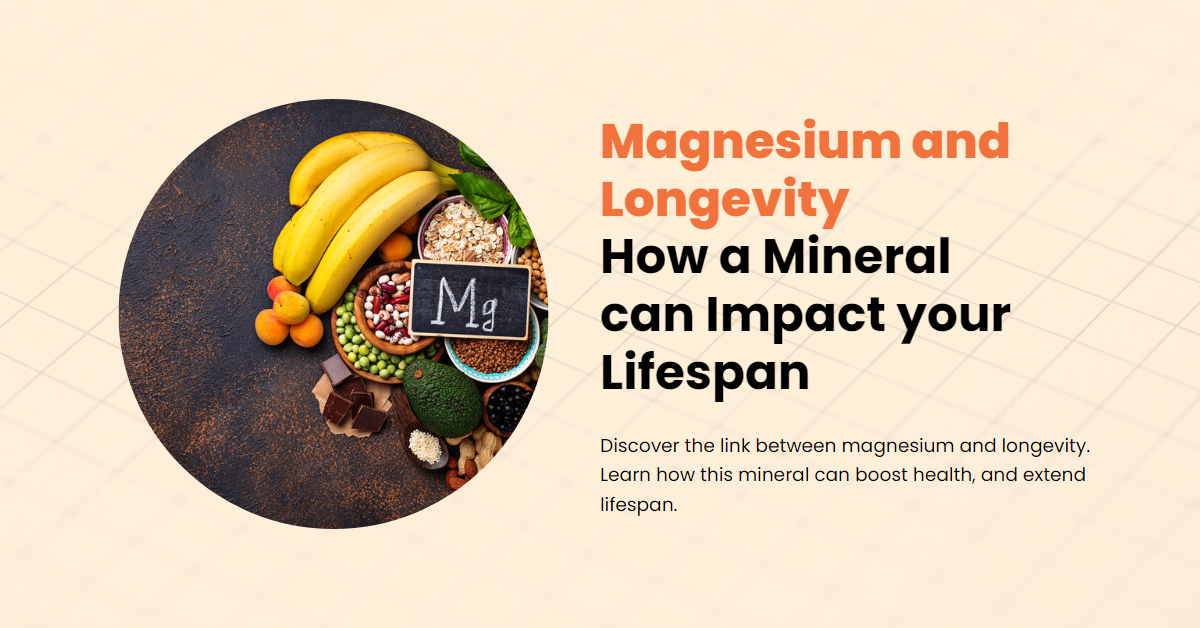Magnesium is an essential mineral that plays a vital role in many of the body’s biochemical processes. It is required for the proper functioning of muscles, nerves, and the immune system. In addition to these important functions, magnesium has also been shown to have anti-aging properties.
Aging is a complex process that involves multiple cellular and molecular changes that occur over time. One of the primary causes of aging is oxidative stress, which is the imbalance between the production of reactive oxygen species (ROS) and the body’s ability to detoxify them. ROS are produced during normal metabolic processes, and excessive ROS production can lead to cellular damage and accelerated aging.
Magnesium has been shown to be critical to your antioxidant system that help to reduce oxidative stress and protect cells from damage. Studies have found that magnesium is critical to the system that can scavenge free radicals and prevent lipid peroxidation, which is a process that damages cell membranes and leads to cell death (1). This makes magnesium an important nutrient for maintaining healthy cells and reducing the risk of age-related diseases.
Another way in which magnesium can help to slow down the aging process is by supporting the body’s energy production. Magnesium is required for the production of ATP (adenosine triphosphate), which is the energy currency of the body. ATP is used to power many of the body’s processes, including muscle contractions, nerve impulses, and the synthesis of proteins and other molecules. As we age, the body’s ability to produce ATP decreases, which can lead to fatigue, reduced muscle strength, and other symptoms of aging.
Research has shown that magnesium supplementation can support ATP production and reduce the risk of age-related decline in muscle function (2). In one study, older adults who took magnesium supplements for 12 weeks had strong muscle strength and physical performance (3). This suggests that magnesium may be an important nutrient for maintaining muscle function and reducing the risk of falls and other age-related injuries.
Magnesium also plays a role in maintaining healthy bones. As we age, bone density decreases, which can lead to injury. Magnesium is required for the absorption and metabolism of calcium, which is a key mineral for bone health. Studies have found that magnesium supplementation can improve bone density and reduce the risk of fractures in older adults (4).
In addition to its physical effects, magnesium may also have cognitive benefits that can help to reduce age-related cognitive decline. Magnesium is required for the production of neurotransmitters, which are the chemicals that transmit signals between neurons in the brain. Research has shown that magnesium supplementation can support cognitive function and reduce the risk of cognitive decline in older adults (5).
One study found that older adults who took magnesium supplements for six months had strong cognitive function and memory compared to those who did not take magnesium (6). This suggests that magnesium may be an important nutrient for maintaining cognitive health and reducing the risk of age-related cognitive decline.
Finally, Magnesium has been shown to reduce levels of blood markers such as CRP (C-reactive protein) and IL-6 (interleukin-6) (7). This suggests that magnesium may be an important nutrient for reducing the risk of age-related decline.
In conclusion, magnesium is an important nutrient with many anti-aging properties. It has antioxidant system-supporting properties that help to reduce oxidative stress and protect cells from reactive oxygen species, support energy production and muscle function, maintain bone health, support cognitive function, and has other properties that help to reduce the risk of aging. While it is possible to get your magnesium from a healthy and careful diet, supplementation might be a good option.
References
- Barbagallo M, Dominguez LJ. Magnesium and aging. Curr Pharm Des. 2010;16(7):832-9. doi: 10.2174/138161210790883463. PMID: 20166926.
- Veronese N, Berton L, Carraro S, Bolzetta F, De Rui M, Perissinotto E, Toffanello ED, Bano G, Pizzato S, Miotto F, Coin A, Manzato E, Sergi G. Effect of oral magnesium supplementation on physical performance in healthy elderly women involved in a weekly exercise program: a randomized controlled trial. Am J Clin Nutr. 2014 Jul;100(1):974-81. doi: 10.3945/ajcn.113.080168. Epub 2014 May 7. PMID: 24808490.
- Dominguez LJ, Barbagallo M, Lauretani F, Bandinelli S, Bos A, Corsi AM, Simonsick EM, Ferrucci L. Magnesium and muscle performance in older persons: the InCHIANTI study. Am J Clin Nutr. 2006 Aug;84(2):419-26. doi: 10.1093/ajcn/84.2.419. PMID: 16895891.
- Castiglioni S, Cazzaniga A, Albisetti W, Maier JA. Magnesium and osteoporosis: current state of knowledge and future research directions. Nutrients. 2013 Jul 23;5(8):3022-33. doi: 10.3390/nu5083022. PMID: 23887789; PMCID: PMC3775240.
- Boyle NB, Lawton C, Dye L. The effects of magnesium supplementation on subjective anxiety and stress-a systematic review. Nutrients. 2017 Apr 26;9(5):429. doi: 10.3390/nu9050429. PMID: 28445426; PMCID: PMC5452159.
- Varner MW, Elbert JL, Hesse JL. The effect of magnesium on memory in the elderly. Neuropharmacology. 1981 Aug;20(8):835-9. doi: 10.1016/0028-3908(81)90080-6. PMID: 7317829.
- Nielsen FH. Magnesium deficiency and increased inflammation: current perspectives. J Inflamm Res. 2018;11:25-34. Published 2018 Jan 18. doi: 10.2147/JIR.S136742. PMID: 29403375; PMCID: PMC5793269.
